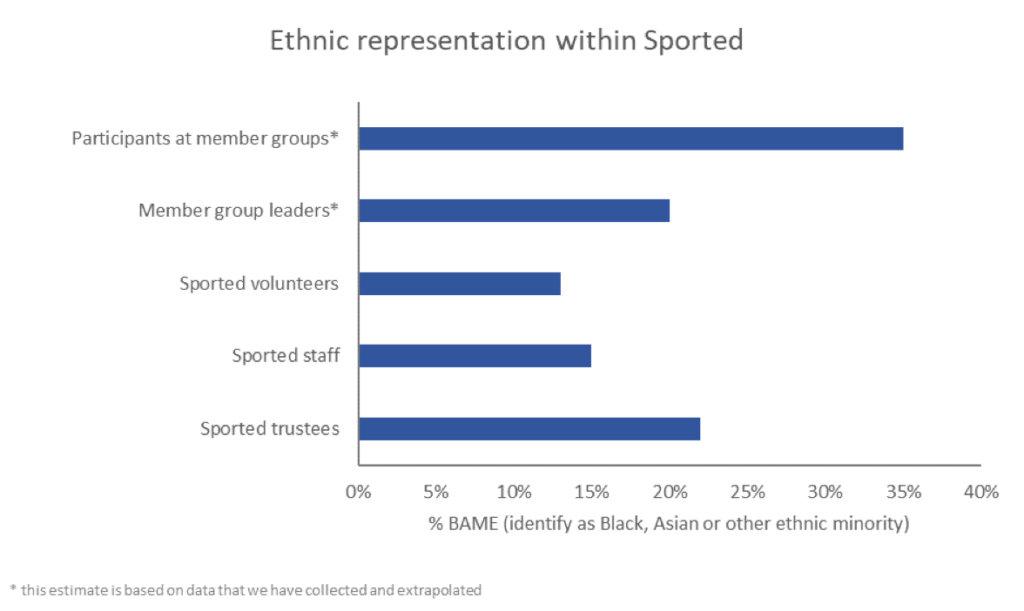Tackling racism in community sport – it’s time to act!
By Nicola Walker, Sported CEO | 23rd October 2020
By Nicola Walker, Sported CEO | 23rd October 2020
Black and Asian people ‘Patronised and poorly represented’ in community sport sector – Sported Reseach
George’s Floyds death created a surge of anger and energy at Sported. Staff members jumped straight into educating themselves on the BLM movement and understanding discrimination experienced by Black people in the US and the UK. We shared and read resources, listened to each other’s experience, attended training courses and looked at our own diversity across management, volunteers and trustees.
As a network organisation we saw it as a priority to gather the views of our members and make sure their voices were heard. We know there is a trend that our members serve geographical areas where a high proportion of people identify as Black.

We invested significant resources to this – spending many hours listening to our members, through focus groups and 1 to 1 phone calls, brought together in our latest research piece ‘Tackling racism at the grassroots.’
Shining a spotlight on racism
Embarking on this piece of work was daunting – the consequences of getting it right and representing our members were high. Cheddi Gore our East Midlands Regional Manager articulated the challenge powerfully:
“It lifted my morale and before I sat down, I thought of the enormous challenge that lay ahead for colleagues and the wider sector to begin the journey of really understanding the effects of racism. I was inspired to get involved and continue the fight for equality and justice. Even though I have lived experiences it was still very difficult and challenging to listen to leaders of sport share their own experiences of race discrimination and the perceived lack of action when dealing with racism in sport, or the inherent inequalities that remain across the sport sector without any notion of accountability but in awarding of Plaques, Charters and Equality Standard Frameworks!”
– Cheddi Gore, Sported East Midlands Regional Manager
When participants shared with such passion and courage our sense of responsibility grew even greater. It felt like we peeled back the surface of community sport and shone a much-needed spotlight on the true experience of managing these organisations. We have tried to do justice to their openness in our analysis – a story which is best told through direct quotes.
‘’I want to see more Black faces in positions of power’’
Clearly a major concern was both the reality of racism within sport and the lack of diversity at management level to help resolve this. Sporting Equals have stated that 40% of Black, Asian and minority ethnic participants say their experiences of local sport or leisure clubs has been negative compared to just 14% of white British.
This lack of representation in the governance of sport was felt keenly by community leaders. Given the talent in the room and calibre of feedback, I can only agree with the comment “People like us should be in there making the strategies”. And yet despite a desire to be more diverse many sporting governing bodies are not welcoming the contribution of Black leaders.
“It’s not until they invite me into the conversation that they realise the valid contributions we are making. We shouldn’t have to work so hard to prove ourselves before we even get invited to the discussion.”
I’m happy to see immediate changes in response to the latest BLM movement, particularly the commitment of Sports Councils to commission work to understand racism and racial inequalities. Through the Perrett Laver network, new appointments are being made to boards and the views of those directly affected are being highlighted. It is encouraging to see Sport England’s blog on Black voices, the first of which was written by one of the participants of our focus group, The Blair Project.
“It’s aimed at us, but it’s not written for us”
Given that many of the community groups in our network do amazing work on shoe-string budgets – access to funding is key. Feedback from Black leaders was that funding streams aimed at increasing diversity are generally not written by diverse people. Participants explained they feel they must write a proposal to tackle racism, but not how they see racism – how the White-led funding organisation sees racism. The funder then suffers from an ‘affinity bias’ towards White-led groups. (Affinity bias is the unconscious tendency to get along or side with others who are like us.)
“Whatever we feed in, the strategy will still be played out through a White lens.”
There is a positive movement to change this with greater BAME representation within funders. But it is an issue that Sported also need to ensure we take note of – creating grant application forms that serve the purpose they are designed for.
Our commitment
At Sported we appreciate that this challenge cannot be resolved overnight. As one participant stated,
“the experiences I had growing up, I don’t want that for the next generation.”
However, we absolutely acknowledge that systemic change is needed in community sport to remove racism and encourage equity. To effectively do this we all have to start listening to those who know best, i.e. those with lived experiences.
Sported wants to give Black community leaders the platform to do so. We have a long-term commitment to represent their voices in the sector and across decision makers. We acknowledge change is required and commit to including those at the fore-front in this process.
“It’s not until they invite me into the conversation that they realise the valid contributions we are making. We shouldn’t have to work so hard to prove ourselves before we even get invited to the discussion.”
– Sported Member